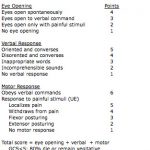Is The Glasgow Coma Scale (GCS) Getting Too Old?
Traumatic brain injury (TBI) is one of the leading causes of death from trauma worldwide. The assessment of TBI was revolutionized in 1976 when the GCS scale was first introduced. Shortly after its introduction, it was found to be predictive of outcome after brain injury. But it does have some drawbacks: it is somewhat complicated, and interrater reliability is low.
Interestingly, a number of studies have shown that the motor component of GCS is nearly as accurate as the full score in predicting survival. Thus, the Simplified Motor Score (SMS) was introduced as a possible substitute for the GCS in 2007. It was found to be equivalent for predicting survival when applied in the ED.
SMS scoring:
- Obeys commands = 2
- Localizes pain = 1
- Withdraws (or less) to pain = 0
So can this scale be validated in the field when applied by prehospital providers?
Nearly 10 years of data (almost 20,000 patients) from the Denver Health trauma registry was analyzed to attempt to validate SMS when used by EMS. Although the statistics were not perfect, they found that GCS and SMS were equivalent for predicting the presence of a brain injury, need for emergency intubation, need for neurosurgical intervention, and death. Interestingly, they found that both SMS and GCS were not quite as good at predicting overall outcomes as previously thought.
Bottom line: The simplified motor score is a simple system that has now been shown to be as accurate as GCS in predicting severity and outcome from head injury. To be clear, though, neither is a perfect system. They must still be combined with clinical and radiographic assessments to achieve the best accuracy. But SMS can and should be used both in-hospital and prehospital to get a quick assessment, and may help determine early intervention and need for activating the trauma team.
References:
- Assessment of coma and impaired consciousness: a practical scale. Lancet 2:81-84, 1976.
- Assessment and prognosis of coma after head injury. Acta Neurochir (Wien) 34:45-55, 1976.
- Validation of the simplified motor score in the out-of-hospital setting for the prediction of outcomes after traumatic brain injury. Ann Emerg Med, in press, Aug 2011.


